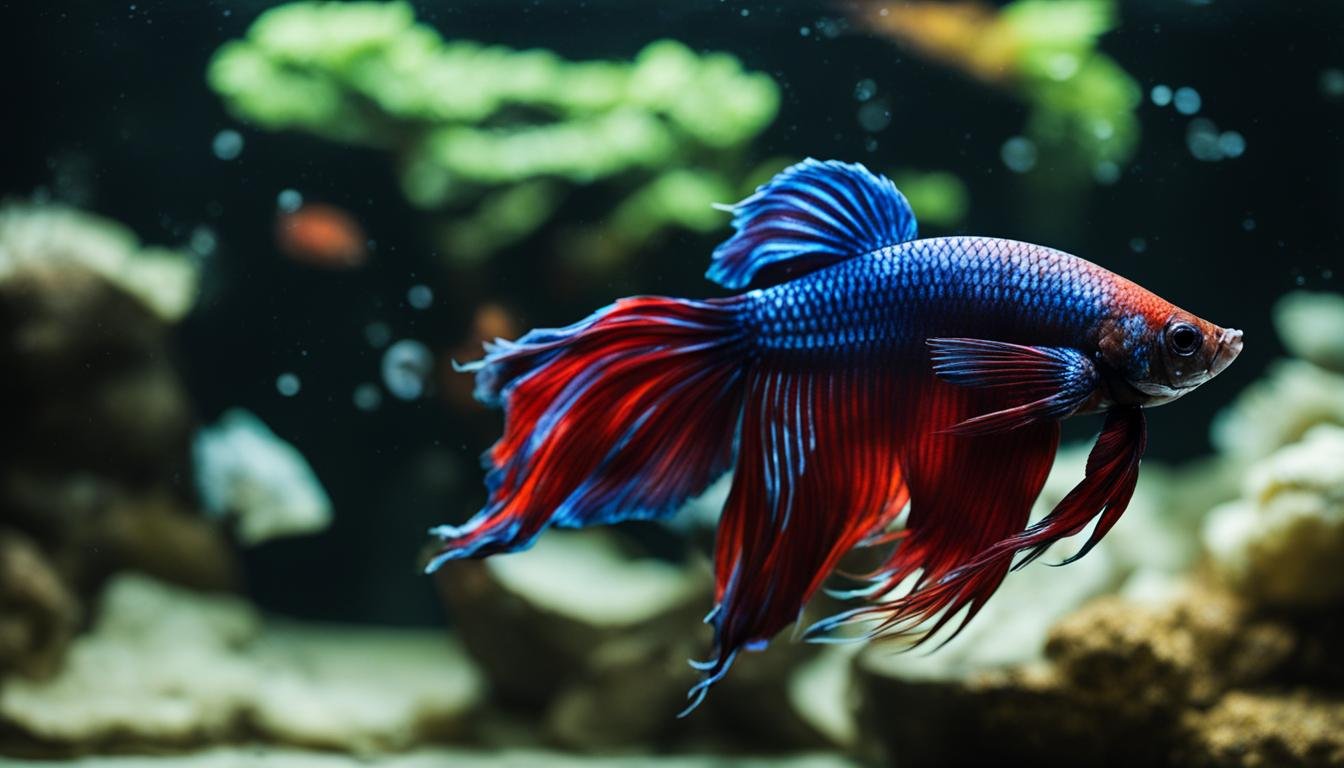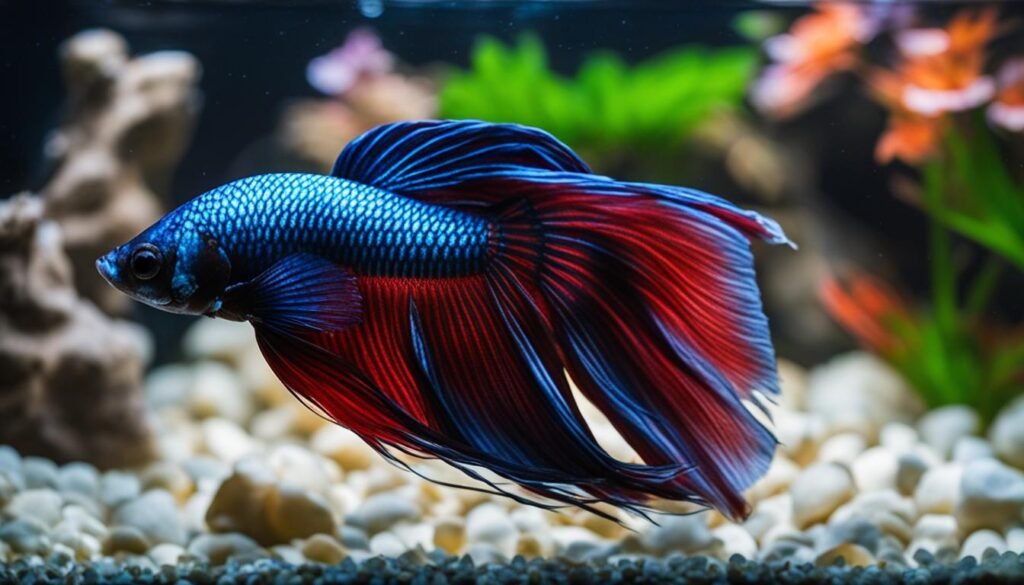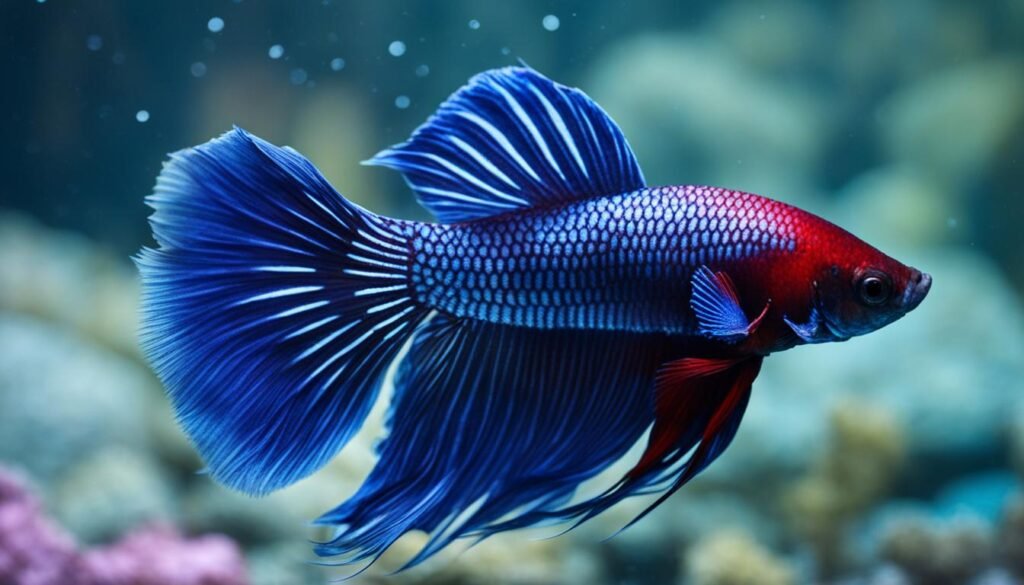Your cart is currently empty!

Understanding If Can Betta Fish Be In The Dark – A Guide
Welcome to our comprehensive guide on understanding if betta fish can be in the dark. As fellow fish enthusiasts, we know how important it is to provide the best care for our aquatic companions. Betta fish, like us humans, are diurnal creatures with limited vision in dark conditions. In this guide, we will explore the effects of darkness on betta fish, their nocturnal vision, optimal lighting conditions, and more. Let’s dive in!
Key Takeaways:
- Betta fish have limited vision in dark conditions due to their small irises.
- Prolonged darkness can lead to decreased activity and potential health issues for betta fish.
- Mimicking their natural light-dark cycle is crucial for maintaining their health and well-being.
- Low to moderate lighting conditions are ideal for betta fish tanks.
- Creating a calm and dark environment promotes healthy sleep patterns for betta fish.
Bettas’ Nocturnal Vision: A Glimpse into the Darkness
Betta fish, with their small irises, have limited vision in dark conditions. While they can see bright, saturated colors with clarity, navigating and finding food in the dark can be challenging for them. Prolonged darkness can also lead to decreased activity and potentially depressed behavior in betta fish. To ensure their well-being, it’s essential to strike a balance between light and darkness.
When it comes to light requirements, betta fish thrive in low to moderate light conditions. Mimicking their natural environment means providing a brightly lit tank during the day and allowing it to be dark at night. This enables bettas to rest and maintain their natural sleep patterns. However, it’s crucial to avoid overstimulating them with excessive artificial light, as it can cause stress and disrupt their sleep cycle.
While betta fish can see in the dark, it’s important to note that their vision in darker conditions is limited. They have small irises that restrict the amount of light entering their eyes, affecting their ability to see in the dark. However, they do possess lateral lines, which help them feel movements and navigate in the dark. Therefore, providing a suitable amount of darkness for them is important for their overall well-being.
How much darkness do Betta Fish need?
- Betta fish require a period of darkness at night to rest and maintain their natural sleep patterns.
- Providing 8-10 hours of darkness is recommended to promote healthy sleep for betta fish.
- Too much light during the night can disrupt their sleep cycle and lead to exhaustion and stress.
Summing it up
Betta fish have limited vision in darker conditions due to their small irises. While they can see bright colors with clarity, providing them with a suitable amount of darkness is crucial for their well-being. Mimicking their natural light-dark cycle and avoiding overstimulation with excessive artificial light is key. By understanding their light requirements, we can ensure that betta fish thrive in our care.
The Ideal Lighting for Betta Fish
Creating the perfect lighting conditions in your betta fish tank is crucial to ensure their well-being and overall health. Mimicking their natural light-dark cycle will help them thrive in their environment. Here are some tips to provide the ideal lighting for your betta fish:
1. Balance Brightness and Darkness
Betta fish require a balance between brightness and darkness in their tank. During the day, provide ample lighting to simulate daylight and allow them to engage in their natural activities. However, it’s equally important to provide periods of darkness to mimic nighttime, allowing them to rest and maintain their sleep patterns. Using a light timer can help maintain a consistent light-dark cycle.
2. Avoid Overstimulation
Excessive artificial light can cause stress to your betta fish. It’s important to provide them with low to moderate lighting to prevent overstimulation. Avoid using overly bright lights or keeping the tank in a well-lit room 24/7. This will help create a more natural and comfortable environment for your bettas.
3. Choose the Right Lighting
LED aquarium lights are an excellent choice for betta fish tanks. They are energy-efficient, produce minimal heat, and can provide the right spectrum of light for your fish. Full spectrum lights are also beneficial as they mimic natural sunlight and enhance the colors of your bettas. Consider investing in smart lights that allow you to customize lighting schedules and effects to provide the best environment for your betta fish.
Betta Fish Vision: Understanding Their Eye Biology

When it comes to betta fish, understanding their eye biology is crucial to ensuring their well-being. These beautiful creatures have small irises that limit the amount of light entering their eyes, affecting their vision in the dark. While they can still see in low light conditions, it’s important to note that their visual capabilities are not as strong as in well-lit environments.
Despite their limited vision in the dark, betta fish have a unique adaptation called lateral lines. These lines help them feel movements in the water, allowing them to navigate and find their way even when it’s dimly lit. This sensory system provides them with an advantage in locating food and avoiding obstacles, making them more adept at surviving in darker conditions.
However, it’s essential to strike a balance between darkness and light to maintain their overall health and well-being. Prolonged darkness can lead to decreased activity and potential health issues in betta fish. As responsible pet owners, we must provide suitable lighting conditions that mimic their natural light-dark cycle and avoid overstimulation with excessive artificial light.
The Impact of Lighting on Betta Fish Health
- Betta fish rely on a combination of limited visual capacity and their lateral line system to navigate in darker conditions.
- Prolonged darkness can lead to decreased activity and potential health issues.
- Mimicking their natural light-dark cycle and avoiding overstimulation with excessive artificial light is essential.
By understanding the biology of betta fish’s eyes and providing them with appropriate lighting conditions, we can help support their overall health and well-being. It’s important to create a calm and dark environment for them to sleep, as they require about 8-10 hours of rest during the night. Adequate lighting during the day to simulate daytime, followed by darkness at night, promotes healthy sleep patterns.
Additionally, maintaining water quality is crucial for betta fish’s vision and overall health. Poor water conditions can lead to bacterial and fungal infections, causing cloudy or swollen eyes and difficulty seeing or locating food. Regular water changes, proper filtration, and monitoring water parameters are essential to prevent these issues and ensure optimal vision in betta fish.
By taking these factors into consideration and providing the best possible care, we can help our betta fish thrive and enjoy their lives to the fullest.
Optimal Lighting Solutions for Betta Fish Tanks
When it comes to creating the perfect environment for your betta fish, choosing the right lighting is crucial. Proper lighting conditions not only enhance the beauty of your fish, but they also play a significant role in their overall health and well-being. Here are some optimal lighting solutions for betta fish tanks:
1. Low to moderate light intensity
Betta fish come from habitats with dim lighting, so it’s important to replicate that in their tanks. Low to moderate light intensity is ideal for bettas as it mimics their natural environment and helps them feel secure. Direct sunlight should be avoided as it can cause temperature fluctuations and encourage algae growth, which can be harmful to your fish.
2. LED aquarium lights
LED lights are a popular choice among betta fish owners for several reasons. They are energy-efficient, long-lasting, and produce minimal heat, reducing the risk of overheating your tank. LED lights also come in various colors, allowing you to create a visually appealing and stimulating environment for your bettas.
3. Full spectrum lights
Full spectrum lights are designed to mimic natural sunlight, providing your bettas with the spectrum of light they need for optimal health. These lights not only enhance the colors of your fish, but they also promote plant growth in your tank. With full spectrum lights, you can create a vibrant and thriving aquatic ecosystem.
4. Smart lights with customizable schedules
If you want to take your betta fish tank lighting to the next level, consider investing in smart lights. These lights allow you to create customized lighting schedules, simulating the natural day and night cycle for your bettas. You can also adjust the intensity and color of the lights to create different moods and effects in your tank.
Overall, providing the right lighting conditions for your betta fish is essential for their health and well-being. By choosing low to moderate light intensity, using LED or full spectrum lights, and utilizing smart lights with customizable schedules, you can create a visually stunning and thriving environment for your bettas. Remember to always monitor your fish’s behavior and adjust the lighting as needed to ensure they are happy and healthy.
Promoting Betta Fish Sleep with Lighting Conditions

Creating a calm and dark environment for betta fish to sleep is essential to support their natural sleep cycle. Adequate sleep is crucial for betta fish to maintain their overall health and well-being. Similar to humans, betta fish require about 8-10 hours of sleep during the night to rest and rejuvenate.
Too much light can disrupt their sleep cycle and lead to exhaustion and stress. It’s important to provide a period of darkness to mimic the natural day-night cycle for betta fish. Turning off the lights at night and allowing the tank to be in complete darkness helps promote healthy sleep patterns.
While betta fish can tolerate some light during the night, it’s best to avoid any sources of bright, artificial light in their immediate surroundings. This includes keeping the tank away from bright room lights or avoiding the use of night lights in their vicinity. By reducing light exposure during the night, we can ensure that betta fish are getting the rest they need.
Key considerations for promoting betta fish sleep:
- Provide a calm and dark environment during the night.
- Turn off tank lights and avoid sources of bright, artificial light.
- Avoid placing the tank near bright room lights or night lights.
By prioritizing betta fish sleep through proper lighting conditions, we can help them maintain optimal health and well-being. Understanding their natural sleep patterns and providing the right environment for restful sleep is essential for keeping our betta fish happy and thriving.
Maintaining Water Quality for Betta Fish Vision

Poor water quality can have detrimental effects on the health and vision of betta fish. It is essential to ensure that the water in their tank is clean and free from harmful toxins and chemicals. When the water is contaminated, it can lead to bacterial and fungal infections, causing cloudy or swollen eyes and difficulty seeing or locating food.
To maintain optimal water quality, regular water changes are necessary. It is recommended to change about 20-30% of the water in the tank every week. This helps remove any accumulated waste, uneaten food, and debris that can contribute to poor water quality. Additionally, proper filtration is essential to keep the water clean and clear. A good quality filter should be used to remove impurities and maintain a healthy environment for the betta fish.
In addition to regular water changes and filtration, it is important to avoid overfeeding the betta fish. Overfeeding can lead to excess food and waste in the tank, which can cause ammonia and nitrate levels to rise, negatively impacting water quality. Feeding the betta fish small, appropriate portions and removing any uneaten food after a few minutes can help prevent overfeeding and maintain cleaner water.
Key Points:
- Regular water changes, about 20-30% every week, help maintain clean water.
- Using a good quality filter helps remove impurities and keep the water clear.
- Avoid overfeeding to prevent excess food and waste that can impact water quality.
Conclusion
After understanding the unique vision capabilities of betta fish, we can conclude that they can indeed see in the dark, although not as well as in well-lit environments. Their small irises limit the amount of light entering their eyes, affecting their ability to navigate and find food in darker conditions. Therefore, it is important to strike a balance between light and darkness to maintain their health and well-being.
To meet the light requirements of betta fish, it is essential to mimic their natural light-dark cycle. Keeping the tank brightly lit during the day and allowing it to be dark at night allows them to rest and maintain their natural sleep patterns. Overstimulating them with excessive artificial light can cause stress and disrupt their sleep cycle, leading to potential health issues.
Providing optimal lighting conditions can greatly enhance the overall health and happiness of betta fish. Low to moderate light, such as LED aquarium lights, is recommended as they are energy-efficient and produce minimal heat. Additionally, maintaining water quality through regular water changes, proper filtration, and monitoring water parameters is crucial for promoting healthy eyesight in betta fish.
By understanding and meeting the lighting needs of betta fish, we can ensure their well-being and create a harmonious environment in which they can thrive. So, remember to strike the right balance between light and darkness, and watch your betta fish flourish!
FAQ
Can betta fish see in the dark?
Betta fish have limited vision in dark conditions due to their small irises. While they can see bright colors with clarity, prolonged darkness can cause them to become less active and potentially depressed.
What is the ideal lighting for betta fish tanks?
It is important to strike a balance between light and darkness to maintain the health and well-being of betta fish. Mimicking their natural light-dark cycle by keeping the tank brightly lit during the day and allowing it to be dark at night is recommended. Avoid overstimulating them with excessive artificial light, and using a light with a timer can help maintain a consistent light-dark cycle.
How does betta fish vision work?
Betta fish have small irises that limit the amount of light entering their eyes, affecting their vision in darker conditions. They can see bright, saturated colors with clarity but struggle to navigate and find food in the dark. They rely on their lateral lines to help them feel movements in the dark, assisting in their nighttime navigation.
What are optimal lighting solutions for betta fish tanks?
LED aquarium lights are a popular option as they are energy-efficient, long-lasting, and produce minimal heat. Full spectrum lights mimic natural sunlight and can enhance the colors of fish. Smart lights allow for customizable lighting schedules and effects.
How can lighting promote healthy sleep patterns in betta fish?
Creating a calm and dark environment for betta fish to sleep is essential to support their natural sleep cycle. Providing adequate lighting during the day to simulate daytime and turning off the lights at night helps promote healthy sleep patterns. Too much light can disrupt their sleep cycle and lead to exhaustion and stress.
How does water quality affect betta fish vision?
Poor water quality can affect betta fish’s vision. Harmful toxins and chemicals can lead to bacterial and fungal infections, causing cloudy or swollen eyes and difficulty seeing or locating food. Regular water changes, proper filtration, and avoiding overfeeding can help maintain water quality and promote healthy eyesight in betta fish.
Leave a Reply